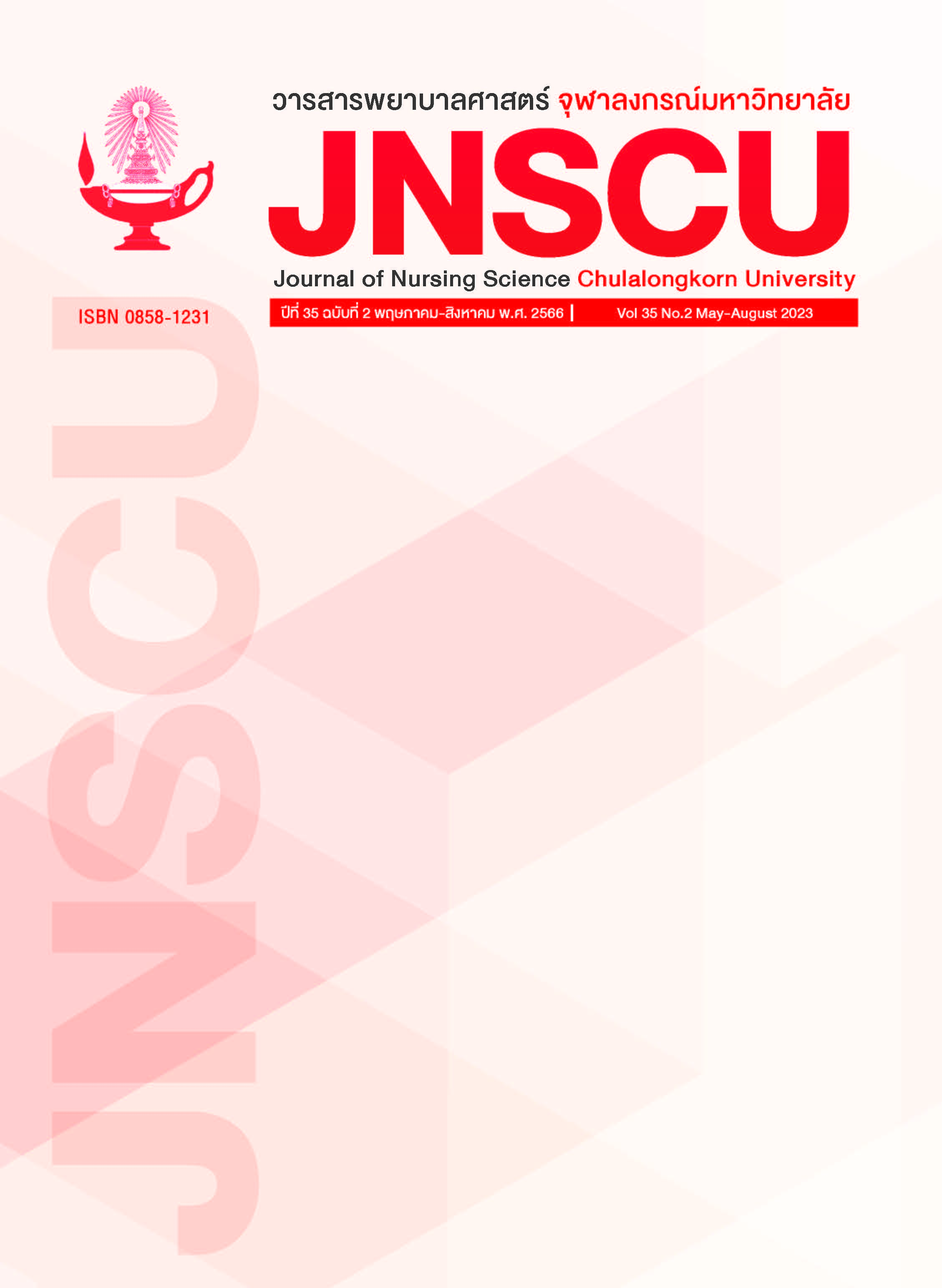ผลของโปรแกรมการบำบัดความคิดและพฤติกรรมต่ออาการซึมเศร้าในผู้สูงอายุ โรคไม่ติดต่อเรื้อรัง(NCDs)
คำสำคัญ:
โปรแกรมการบำบัดความคิดและพฤติกรรม, อาการซึมเศร้า, ผู้สูงอายุโรคไม่ติดต่อเรื้อรังบทคัดย่อ
วัตถุประสงค์การวิจัย: เพื่อศึกษาผลของการใช้โปรแกรมการบำบัดความคิดและพฤติกรรมต่ออาการซึมเศร้าในผู้สูงอายุโรคไม่ติดต่อเรื้อรัง
รูปแบบงานวิจัย: การวิจัยกึ่งทดลอง
วิธีการดำเนินการวิจัย: กลุ่มตัวอย่างคือผู้ที่มีอายุ 60 ปีขึ้นไป ซึ่งได้รับการวินิจฉัยจากแพทย์ว่าเป็นโรคใดโรคหนึ่งหรือเป็นโรคร่วมตั้งแต่สองโรคขึ้นไปในกลุ่มของโรคไม่ติดต่อเรื้อรัง จำนวน 60 ราย เครื่องมือวิจัยคือแบบบันทึกข้อมูลส่วนบุคล โปรแกรมการบำบัดความและพฤติกรรมโดยผ่านการตรวจสอบความตรงตามเนื้อหาจากผู้ทรงคุณวุฒิ 3 ท่านมีค่าดัชนีความตรงตามเนื้อหาเท่ากับ .90 และแบบแบบวัดภาวะซึมเศร้าในผู้สูงอายุของไทย (TGDS) มีค่าความเที่ยงของเครื่องมือค่าสัมประสิทธิ์แอลฟ่าของครอนบาดเท่ากับ .91 จัดกลุ่มตัวอย่างด้วยการจับคู่พิจารณาจากเพศและระดับคะแนนอาการซึมเศร้า แบ่งเป็นกลุ่มละ 30 ราย กลุ่มควบคุมได้รับการพยาบาลโดยการให้คำปรึกษาตามปัญหาที่พบ และกลุ่มทดลอง ได้รับโปรแกรมการบำบัดความคิดและพฤติกรรมจำนวน 9 กิจกรรม ประกอบด้วยการเริ่มต้นสร้างสัมพันธภาพ การจัดกิจกรรมสิ่งที่มีอิทธิพลต่อความรู้สึกและการฝึกทักษะการผ่อนคลาย การปรับโครงสร้างทางการรู้คิดโดยค้นหาความเชื่อที่ผิดและความคิดอัตโนมัติด้านลบ การปรับโครงสร้างทางความคิดและความเชื่อที่ไม่เหมาะสมเกี่ยวกับอาการซึมเศร้า การสร้างเสริมรูปแบบการจัดการอาการซึมเศร้าที่เหมาะสม จำนวน 3 กิจกรรม การใช้เทคนิคการพูดกับตนเอง (self-talk) และทบทวนการเรียนรู้ในการฝึกทักษะที่เข้าร่วมในโปรแกรมร่วมกับการวางแผนการนำทักษะไปใช้ในอนาคต วิเคราะห์ข้อมูลโดยใช้สถิติบรรยาย และทดสอบค่าเฉลี่ยโดยใช้สถิติทดสอบที (t-test)
ผลการศึกษา: คะแนนเฉลี่ยอาการซึมเศร้าในกลุ่มทดลองที่ได้รับโปรแกรมการบำบัดความคิดและพฤติกรรมต่ำกว่าก่อนได้รับโปรแกรมอย่างมีนัยสำคัญทางสถิติ (p‹.05) และพบว่าคะแนนเฉลี่ยอาการซึมเศร้าในกลุ่มทดลองภายหลังได้รับโปรแกรมการบำบัดความคิดและพฤติกรรมต่ำกว่ากลุ่มควบคุมอย่างมีนัยสำคัญทางสถิติ (p‹.05)
สรุป: โปรแกรมการบำบัดความคิดและพฤติกรรมช่วยให้ผู้สูงอายุที่ป่วยด้วยโรคไม่ติดต่อเรื้อรังให้มีอาการซึมเศร้าลดลง ควรนำโปรแกรมนี้ไปเผยแพร่กับผู้สูงอายุกลุ่มอื่น และควรศึกษาวิจัยในบุคคลที่มีความเสี่ยงต่อการเกิดอาการซึมเศร้าต่อไป
เอกสารอ้างอิง
World Health Organization (WHO). The world health report 2013. Research for universal health coverage. Geneva: WHO.2013.
Institute for Population and Social Research, Situation of the Thai older persons: Mahidol
University; Nakhon Pathom. 2021; 5-6. https://ipsr.mahidol.ac.th/post_research/situation- of-the-thai-older-persons-2021/.
Division of Non communicable diseases Ministry of health. Non communicable diseases.
https://multimedia.anamai.moph.go.th/news/141165/
Division of Non communicable diseases Ministry of health .Annual report 2017.
http://www.thaincd.com/ NCDReport60.pdf
Department of mental health (2562). "Depression" breaks your heart. Check the list of causes
and symptoms. https://www.dmh.go.th/news- dmh/view.asp?id=30114https://www.dmh.go.th/news-dmh/view.asp?id=30114.
Train the Brain Forum Committee. The Geriatric Depression Scale (TGDS). Siriraj Hospital Gazette 1994; 46(1): 1-9.
Beck AT. Cognitive therapy for challenging problems. New York: The Guilford Press. 2005.
Arkhom B. Prevalence and factors Associated with Depression among the elderly community residents with chronic diseases in samliam urban primary care unit. Khon Kaen Srinagarind Med J 2016; 31(1): 25-33.(In Thai)
Sararuk M , Chuntuang C, Chutakulkit S. Factors related to depression among elderly in non- communicable diseases patients receiving services at phoyai sub-district health promoting hospital warin chamrap district ubon ratchatthani province. Research and Innovation for SDGs in the Next Communicable Diseases Patients Receiving Services at
Health Normal 2022: 241-251. (In Thai)
Paungrod N. The study on depression in nonthaburi province elderly. Princess of narathiwas university journal of humanitics and social scinces 2005; 2(1): 63-74. (In Thai).
Duangnate k. Prevalence and factors associated depress among NCD patients primary care unit of phukieo chalerprakiat hospital.medical journal of srisaket surin burirum hospital 2022; 36 (1) 13-24. (In Thai)
Suksawat B, Hengudomsub P, Nabkasorn C. The Effects of Group Cognitive Behavioral
Modification Program on Hope and Depression among Community-Dwelling Older
Adults.The Journal of Faculty of Nursing Burapha University 2017; (25)1: 95-107.
Beck JS. Cognitive Behavior therapy: Basic and beyond (2nd edition). New york:The Guilford press. (2011).
Wagner EH. Chronic disease management: What will it take to improve care for chronic illness? Effective Clinical Practice. [Internet]. 1998 (cited 2020 June 11);1(1):2–4. Available from: https:// access.portico.org/Portico/auView?auId=vark%253A% 252F27927%252Fphwwtrq 3nv&auView Type1=PDF
Noisong A. The effects of a cognitive behavioral therapy program on the anxiety and depression among patients receiving renal replacement therapy. A thesis submitted in partial fulfillment of the requirements for the degree of master of nursing science in psychiatric and mental health nursing faculty of nursing Thammasat university academic year copyright of Thammasat university.2018
http: ethesisarchive.library.tu.ac.th/thesis/2018/Tu2018 5814030051 8989 11267pdf.
Suksawat B, Hengudomsub P, Nabkasorn C. The effects of Cognitive Behavioral Modification Program on hope and depression among community-dwelling older adults. The journal of faculty of nursing burapha university 2017; 25 (1); 95-107. (In Thai)
Laidlaw K, Mcalpine S. Cognitive behavior therapy : How is it different with older people?.Journal of Rational- Emotive & Cognitive-Behavior Therapy 2008; 26; 250-62.
Thato R. Nursing research : concepts to application (fourth edition). Chulalongkorn University Printing House. 2018.
Little RJA, Rubin DB. Statistical analysis with missing data (2nd ed). New York : John Wiley & Sons. 2002.
Chaiyasung P, Sutawatnatcha S, Intakan P, Linchanatcin S. Predictors of depression among older adult with chronic disease in urban area. Journal of Nursing and Education 2013; 6(1): 27-37. (In Thai)
DeRubeis RJ, Shelton RC, Amsterdam JD, Salomon RM, Reardon JP, Lovett ML, et al. Prevention of relapse following cognitive therapy vs medications in moderate to severe depression. Archives of General Psychiatry 2005; 62(4): 417-22.
Fishman B, Losscalo M. Cognitive behavioral interventions in management of cancer pain: Principle and applications. Medical Clinics of North America 1978; 71: 271-287.
Folkman S, Chesney M, Mckusick L, Ironson G, Johnson DS, Coates TJ. Translation coping theory into an intervention. In J. Eckenrode (Ed.). The social context of stress: New York: Plenum 1991; 409-416.
ดาวน์โหลด
เผยแพร่แล้ว
ฉบับ
ประเภทบทความ
สัญญาอนุญาต
ลิขสิทธิ์ (c) 2023 วารสารพยาบาลศาสตร์ จุฬาลงกรณ์มหาวิทยาลัย

อนุญาตภายใต้เงื่อนไข Creative Commons Attribution-NonCommercial-NoDerivatives 4.0 International License.
##default.contextSettings.thaijo.licenseTerms##


